

Saudi Arabia and the Syrian Brotherhood. Toby Jones - Saudi Arabia Versus the Arab Spring. Is Saudi Arabia Stable? Salman al-Awdah: In the Shadow of Revolutions. There is nothing that prompts us to encourage revolution as it is enshrined in danger...It just comes when profound reform has stumbled.— Salman al-Awdah.
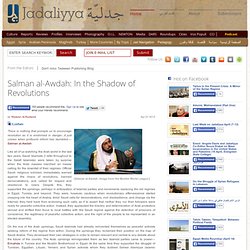
A Saudi Spring of Sand Storms: Signs of Domestic Turbulence - 2011 - Events - Middle East Centre. Speaker: Professor Madawi Al Rasheed, King's College London Chair: Professor Fawaz Gerges, LSE Monday 17 October 2011, 18:30 - 20:00, Wolfson Theatre Professor Al Rasheed's lecture will survey Saudi domestic politics during the so-called Arab Spring and explore classic regime strategies to contain signs of turbulence.
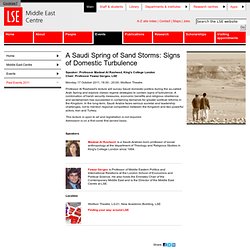
A combination of harsh security measures, economic benefits and religious obedience and sectarianism has succeeded in containing demands for greater political reforms in the Kingdom. In the long-term, Saudi Arabia faces serious societal and leadership challenges, not to mention regional competition between the Kingdom and two powerful actors, Iran and Turkey.
This lecture is open to all and registration is not required. Speakers. Saudi Islamists and the Potential for Protest. Saudi Arabia has remained fairly quiet during the recent months of Arab uprisings.

A few demonstrations did take place, mostly in the Eastern Province, but never gathered more than a couple of thousands. As for the Facebook calls for a "Saudi revolution" on March 11, they had no real impact on the ground. Some observers found this surprising, given the fact that many of the causes of revolutions elsewhere in the region exist in Saudi Arabia. There is corruption, repression, and, despite the country's wealth, socioeconomic problems that particularly affect the youth -- it is said that at least 25 percent of Saudis below age 30 are unemployed.
Some observers argued that nothing had happened, or even could happen, in Saudi Arabia because the kingdom possesses two extraordinary resources in huge quantities. Neither Islam nor oil wealth necessarily shield the Saudi state from criticism. Political Imaginaries in Saudi Arabia: Revolutionaries without A Revolution. The contemporary Saudi-led counterrevolution, fierce as it has been throughout the Arab world, is perhaps most relentless inside the Kingdom’s own borders.
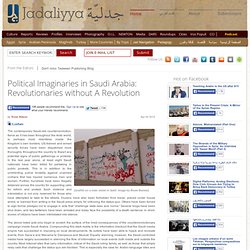
US-trained and armed security forces have been dispatched more thoroughly throughout the country to thwart any potential signs of public gatherings or protests. In the last year alone, at least eight Saudi nationals have been killed for partaking in public protests. This is in addition to the unrelenting police brutality against unarmed civilians that has injured numerous men and women. Further, hundreds have been illegally detained across the country for supporting calls for reform and protest. Such violence and intimidation is not only reserved for those who have attempted to take to the streets. Saudi Arabia vows “iron fist” to end violence - Culture & Society. Saudi Arabia has vowed to use an “iron fist” to end violence in the country’s east after a sermon preached last week criticised the government’s use of violence against protestors in the kingdom.
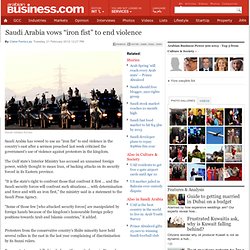
The Gulf state’s Interior Ministry has accused an unnamed foreign power, widely thought to mean Iran, of backing attacks on its security forced in its Eastern province. “It is the state's right to confront those that confront it first ... and the Saudi security forces will confront such situations ... with determination and force and with an iron first,” the ministry said in a statement to the Saudi Press Agency.
“Some of those few [who attacked security forces] are manipulated by foreign hands because of the kingdom's honourable foreign policy positions towards Arab and Islamic countries,” it added. The Price of Dissent in Saudi Arabia. Hamza Kashgari’s persecution—merely for tweeting uncertainty about his religious faith—exposes the cynicism and brutality of the kingdom’s royal-clerical rulers.
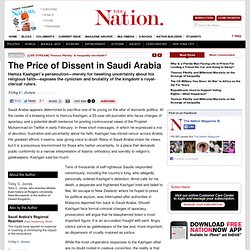
Saudi Arabia appears determined to sacrifice one of its young on the altar of domestic politics. At the center of a brewing storm is Hamza Kashgari, a 23-year-old journalist who faces charges of apostasy and a potential death sentence for posting controversial views of the Prophet Muhammad on Twitter in early February. In three short messages, in which he expressed a mix of devotion, frustration and uncertainty about his faith, Kashgari has stirred rancor across Arabia. His greatest affront, it seems, was giving voice to doubt. Many in Saudi Arabia share his views, but it is a poisonous environment for those who harbor uncertainty. About the Author Toby C. Yes, It Could Happen Here - by Madawi Al-Rasheed. In the age of Arab revolutions, will Saudis dare to honor Facebook calls for anti-government demonstrations on March 11?

Will they protest at one of Jeddah's main roundabouts? Or will they start in Qatif, the eastern region where a substantial Shiite majority has had more experience in real protest? Will Riyadh remain cocooned in its cloak of pomp and power, hidden from public gaze in its mighty sand castles? Saudi Arabia is ripe for change. Despite its image as a fabulously wealthy realm with a quiescent, apolitical population, it has similar economic, demographic, social, and political conditions as those prevailing in its neighboring Arab countries. "Death to Al Sa`ud" Chants by Thousands in Saudi Arabia's Eastern Province: A Game Changer?
[This post will be updated and further corroborated in the coming days] Saudi security forces have killed at least three people in al Qatif, in the Eastern Province of Saudi Arabia, since the killing of nineteen-year-old Naser al-Mheishi during confrontations with security forces at a road block in the Shweika district on Sunday 20 November 2011.
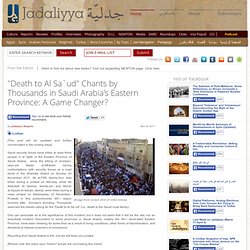
Ali al-Filfil, twenty-four, was killed during a protest on Monday, while Ali Abdullah Al Qreires, twenty-six, and Munib al-Sayyid Al Adnan, twenty, were killed during a mass protest on Wednesday 23 November. Protests in this predominantly Shi`i region evolved after Sunday's shooting. Thousands swarmed the streets calling for the "Death to Al Sa`ud" (i.e., death to the Saudi royal family). One can speculate as to the significance of this incident, but it does not seem that it will be the last, nor an anecdotal incident. Journalist Who Questioned Legitimacy of Saudi Regime Suspended from National Press Club. On Monday, 14 November 2011, I went to a news conference at the National Press Club, where I am a member, titled "His Royal Highness Prince Turki al-Faisal al-Sa'ud of Saudi Arabia.
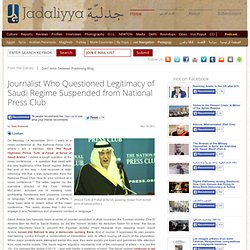
" Saudi Arabia's King Abdullah promises $36 billion in benefits. After three months away, Saudi Arabia's King Abdullah bin Abdul Aziz promised his subjects billions of dollars in new benefits as he returned home today to a region roiled by revolt.
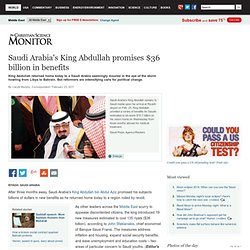
Skip to next paragraph Subscribe Today to the Monitor Click Here for your FREE 30 DAYS ofThe Christian Science MonitorWeekly Digital Edition As other leaders across the Middle East scurry to appease discontented citizens, the king introduced 19 new measures estimated to cost 135 riyals ($36 billion), according to John Sfakianakis, chief economist of Banque Sausi Fransi. The measures address inflation and housing, expand social security benefits, and ease unemployment and education costs – two areas of particular concern to Saudi youths. Saudi Arabia's unrest in Qatif. Here's a piece on a topic that gets scant coverage generally speaking — the wave of protests and dissidence that has hit Saudi Arabia over the last year. Jess Hill in the Global Mail: It's all happening in Saudi Arabia's Eastern Province, home to most of the Kingdom's Shia minority, and 90 per cent of its oil.
Seven people have been shot dead by Saudi security forces since October 2011, two in the past month alone. The Saudi Interior Ministry says these deaths resulted from gun battles between protesters and police. But in all amateur videos that show protesters being shot, there is no evidence that protesters were shooting back.There have been remarkable scenes of rebellion. Saudis Stymied by Fear - IWPR Institute for War & Peace Reporting - P50463. Desire for change is there, but state control is too great. People in Saudi Arabia don’t have much personal experience of political organisation or protest. But we have watched the uprisings in the region very closely, feeling that these were our revolutions too - we are all Arab and we all feel the pain of dictatorships. When the revolutions began in Tunisia and Egypt, our government here was very afraid. They dedicated billions of dollars and created 30,000 new jobs in the security sector to combat any potential unrest, as well as taking steps to strengthen the religious establishment even further.
The government knows that in Saudi Arabia, religion has huge power. It’s true that some Saudis want to keep the regime the way it is. There are some small signs, though. Ten weeks ago, some activists held a demonstration outside the interior ministry to protest the fact that more than 10,000 people had been held in prison for over a year without facing charges or trial.